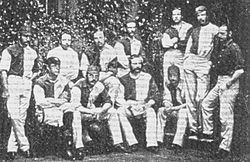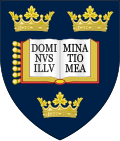 | ||
| Full name | Oxford University Association Football Club | |
|---|---|---|
| Nickname | Blues | |
| Founded | 9 November 1871 | |
| Ground | Iffley Road Stadium, Oxford, England | |
| Capacity | 499 | |
| President | | |
| Captain | | |
| League | BUCS MARS Midlands Division 1A | |
| 2023–24 | 1st | |
| Website | ouafc.co.uk | |
Oxford University Association Football Club is an English football club representing the University of Oxford. It is affiliated to the Football Association as the Oxford University FA, and has representation on the FA Council equivalent to a County Football Association. [1] [2]
Contents
Oxford University was one of the earliest winners of the FA Cup, having achieved it in 1874 after beating the Royal Engineers. The club currently plays in the BUCS Football League, the league system of British Universities and Colleges Sport (BUCS). In 2020, the club merged with Oxford University Women's Association Football Club (OUWAFC) to create one single entity.


